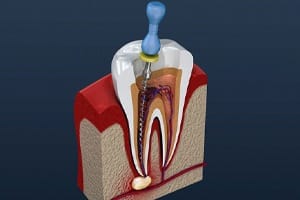Root Canal Therapy – Waterford, PA
Getting Rid of Your Infection and Your Pain
Ignoring a toothache can be a dangerous mistake. The pain could be a symptom of an infection that needs to be treated as soon as possible or else the damage it causes could lead to tooth loss and other potentially severe health issues. Make an appointment at Summit Family Dentistry right away if your toothache is severe or doesn’t go away after a couple of days; we might need to perform root canal therapy so that you can keep all of your pearly whites.
Who Is a Candidate for Root Canal Therapy?

Root canal therapy is performed when oral bacteria enter your tooth and infect the pulp. The pulp is the part of the tooth that contains all the nerves, which is why it hurts. Getting rid of the pulp will stop the infection from spreading any further or causing irreparable damage to the rest of the tooth. The sooner the procedure is performed, the better it will be for your smile.
You might have a tooth infection if you experience the following symptoms:
- Severe or persistent pain in your tooth or jaw
- Swelling around the affected tooth or on your face, neck or head
- Teeth that are suddenly sensitive to hot or cold temperatures
- Blisters on your gums
- Tooth discoloration
How the Procedure Works

After preparing the area around the tooth as needed, a hole in the enamel is made. We can then take out the pulp as well as any decayed nerve tissue and related debris. The inside of the tooth is thoroughly cleaned using a series of root canal files. Once the procedures done, the access hole is resealed. Usually a crown is needed to protect the tooth afterwards; this is especially true if it’s near the back of your mouth.
Your tooth may be sensitive for a few days after root canal therapy. Take pain medication and antibiotics as directed and avoid eating hard foods for a few days.
Benefits of Root Canal Therapy

Whenever saving the tooth from infection is possible, we will always recommend root canal therapy over an extraction for the following reasons:
- A full set of teeth is necessary to maintain the natural structure of your mouth. When there’s empty space, your other teeth might drift and cause your bite to collapse, creating chewing difficulties.
- By saving your tooth, you can avoid needing to pay for a restoration such as a dental bridge or implant to replace it.
- Despite what many people believe, root canal therapy is less painful than a tooth extraction.
Is Root Canal Therapy Painful?

You might have heard that root canal therapy is one of the most painful dental procedures you can have, but a dentist can tell you that’s a myth. Anesthesia is used to numb the area around the tooth; thanks to modern tools and techniques, you’ll experience little to no discomfort during the procedure. Any discomfort you experience during recovery can be easily controlled.
Understanding the Cost of Root Canals

After breathing a sigh of relief that root canal treatment isn’t painful, many patients realize they have another important question, “How much does it cost?” Don’t worry – we will always provide you with an estimate of the price beforehand. Until your appointment, you can learn more about the cost of root canals right here!
Factors That Can Affect Root Canal Cost

At Summitt Family Dentistry, we take pride in creating custom treatment plans for all of our patients. So, we need to learn a bit more about your specific dental needs before determining the price. A few of the many factors we need to consider include the location of the tooth, the complexity of your case, and the restoration used to protect your tooth moving forward. As always, we will review all of these details with you and why they’re important at your consultation so you know what we recommend and why.
Is it Cheaper to Pull My Tooth?

Sometimes, patients compare the cost of root canal treatment to a tooth extraction and think that the latter is cheaper. However, that’s usually not the case. After all, you need to also factor in the cost of the dental bridge or implant needed to fill the open space in your smile. Plus, there is a significantly longer recovery period, and, even though there have been significant advancements in the field of dentistry, there’s no true replacement for your natural teeth.
Does Dental Insurance Cover Root Canal Treatment?

Fortunately, many patients have dental insurance benefits that cover a portion of the cost of root canal treatment. For example, your provider may cover 50% or more of the price of the restoration needed to protect your tooth from further harm. If you come in for an emergency exam, they might cover the cost of the diagnostic care as well! If you aren’t familiar with your coverage, don’t worry – we’re in-network with several popular carriers, including Aetna, Cigna, and Delta Dental, and we’d be happy to answer any questions you have about your available benefits.
Other Options for Making Root Canal Treatment Affordable

Of course, not all patients have dental insurance. In fact, about 50% of patients don’t! If you’re in this camp, then you’ll be happy to know that we offer another financial solution: flexible financing. With third-party financiers like CareCredit, you won’t have to worry about paying for the entire cost of your care at once, putting a pinch on your wallet in the process. Instead, you can space out your payments into smaller, monthly chunks that fit neatly into your monthly budget.
Root Canal FAQs

Do you have an upcoming root canal? If so, you may be worried about it because of all the scary rumors you’ve heard. Unfortunately, far too many patients let the nerves get to them and put off the procedure, causing them to lose their teeth. At Summit Family Dentistry, we don’t want your anxiety to prevent you from having the healthy smile you deserve. To help ease your nerves, our team has decided to answer some frequently asked questions below.
How Long Does It Take to Recover from a Root Canal?
Even though the recovery time is different for everyone, most patients can return to their usual activities the day following their root canal. Keep in mind that strenuous exercise can divert blood from the site and delay the healing process. That said, if your job requires physical labor, it’s best to take the next two to three days off. Your mouth will also feel sore in the first few days following your procedure. Luckily, you can easily manage your discomfort by taking over-the-counter pain medication and using cold compresses. While you heal, make sure you avoid chewing on the side of your mouth that had the root canal.
Can I Eat Before a Root Canal?
It depends! If you’re being sedated for the procedure, you’ll likely be asked to fast for a few hours beforehand to lower the risk of nausea. On the other hand, patients who won’t be receiving sedation are encouraged to eat a healthy meal at least a couple of hours before the root canal. Since your mouth will be numb afterward, you’ll have difficulty eating until the sensation fades away.
How Long Do Root Canals Take?
Although root canal therapy can usually be completed in one appointment, it may sometimes take two. During your visit, Dr. Patel will place a temporary antibacterial medicine inside the tooth to relieve your pain. Then, you’ll return to the office to have the inside of your tooth cleaned out. In most cases, the procedure will take anywhere between 30 to 90 minutes. Of course, the amount of time varies depending on the location of the tooth within the mouth. The farther back you go, the longer your root canal will take.
Can Root Canals Be Prevented?
Root canals aren’t entirely avoidable, but there are many steps you can take to avoid needing one. One of the best ways to prevent root canals is by taking proper care of your oral health. Practicing good dental hygiene, visiting your dentist regularly, and following a healthy lifestyle can help minimize the risk of bacteria reaching a tooth’s pulp. If you play sports or grind your teeth at night, ask Dr. Patel about a custom-made oral device to keep your smile safe.
